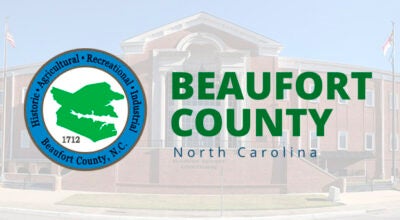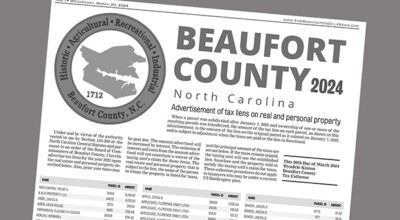State treasurer warns of coming shortfalls
Published 7:51 pm Friday, May 15, 2020

- (Vail Stewart Rumley/Daily News)
|
Getting your Trinity Audio player ready...
|
North Carolina Treasurer Dale Folwell is getting the message out that revenue shortfalls for local governments could be coming, and he’s sharing his thoughts on how to lessen the impact.
“We are looking at revenue shortfalls because people aren’t mobile, and when you have no mobility, you can’t consume. I’m especially concerned about Beaufort County in terms of its taxes associated with fuel, occupancy taxes, tourism taxes and sales tax,” Folwell said.
Folwell said rural counties and municipalities could be especially challenged by shortfalls.
“Absolutely (it will affect) more rural regions, some of which — even with the stock market at all-time highs, and employment at an all-time high — were barely crawling out of the recession of ’08, and this is going to be way deeper,” Folwell said.
Folwell said North Carolina is actually in a strong position to weather the economic impact of the pandemic compared to other states. Part of that comes from the state’s strong fiscal position: $2 billion in unappropriated state budget funds; $1.5 billion in a rainy-day fund; a $4 billion trust fund to pay unemployment benefits; as well as North Carolina’s $4 billion share of the federal CARES Act, $2 billion of which remains.
“I don’t know of another state that is as big as we are, that has the ability to pull itself out of this,” he said.
However, local governments are likely going to have to adapt in order to continue to provide the same level of services.
“Our eyes have to be more wide open, and as good as we thought we were about watching the pennies and paperclips, we’ve got to be even better,” Folwell said. “What that means is there’s got to be a new focus on what we have to have and what we wanted to have, as it relates to services and major expenditures and things of that nature.”
Beaufort County and the City of Washington are in relatively good positions: Washington has a fund balance of $8,707,967 or 67% of general fund expenditures; Beaufort County has a fund balance of $16,451,137 or 28% of general fund expenditures. The county also received $1,014,608 in state recovery funds. Other eastern North Carolina counties and municipalities, however, are not as financially stable. The treasurer’s office keeps a “Watch List” of local governments, based on audited financial data. Bath and Belhaven are both on the list, though their financial positions improved from 2018 to 2019, according to the 2020 Unit Assistance List.
“The watch list was developed before COVID-19, so you can only imagine that anybody that was facing trouble pre-COVID-19, will be facing more now,” Folwell said. “My major concern is the impact this is going to have on communities like yours that will create economic inequality. It’s the lower-income and the fixed-income people that get hurt the worst.”
Folwell said there a few ways the average person can help their local governments: though a law was passed last week allowing North Carolina residents to delay paying to renew their license plate tags, those who can afford to pay, should.
“People who have the economic means, the best thing they can do to help their county, city or volunteer fire department, is do not wait,” Folwell said.
Folwell also said he supported the recent letter signed by chairman of 10 eastern North Carolina county boards of commissioners — including Beaufort — asking Gov. Roy Cooper to allow counties to set their own recommendations to reopen.
Folwell said it’s a matter of common sense, of which North Carolinians have an abundance.
“The No. 1 thing is that even though we’re all working together, we’re in different boats.
Beaufort is in a different boat than Bertie County; Bertie County is in a different boat than Tyrrell County. Tyrrell County is in a different boat than Pitt County. Pitt County is in a different boat than Lenoir County,” Folwell said.
“I’m very confident that they can figure out what’s right, get it right, and keep it right for the life and livelihood of their community,” he said. “The problem is, right now, (people are) concerned about how they’re going put food on the table and where and when they’re going to go back to work.”




